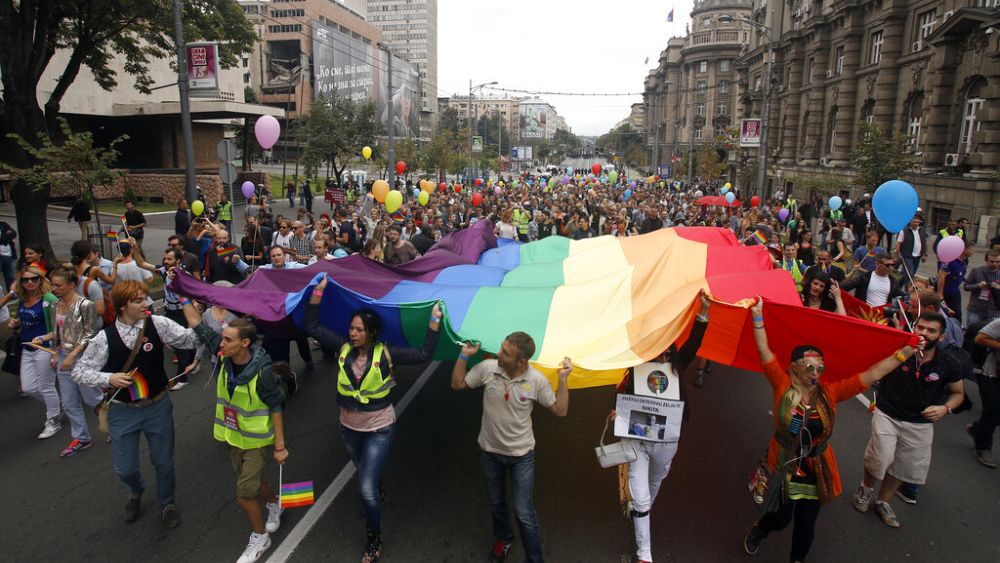
The European project was meant to unite countries with diverse cultures around a common set of values that uphold human rights, freedom and democracy. But how similar are cultural values in different European countries?
According to recent data from the World Values Survey (WVS), a global study that explores people’s values and beliefs, Europe as a whole is becoming more socially-liberal, but there are huge geographic discrepancies.
“The level of economic development is a major indicator,” said Dr Christian Welzel, the Vice President of the WVS. “But it correlates with a lot of other things, like corruption, the quality of democratic institutions, religious traditions.”
Protestant countries tend to be more liberal than Catholic ones, which are more liberal than Orthodox cultures, which are slightly more liberal than Muslim ones, Welzel told Euronews Culture.
“We also found a climatic correlation, what I call the cold water index,” he said. The colder and wetter a region is, the more you have positive societal outcomes like gender equality, tolerance of diversity, openness, lower levels of corruption, better working democratic institutions, less vulnerability to populism and right-wing extremism.”
The WVS began in Europe in the 1980s as a way to gauge how populations really felt about certain social issues, from migration to gender to corruption and beyond. The seventh wave of the study was conducted from 2017-2022.
So how do European countries rank when it comes to some of the most divisive issues in the media today?
Abortion
Abortion has been under fire in Western countries since the United States Supreme Court overturned Roe v. Wade last year. In the wake of the ruling, the European Parliament voted in favour of a resolution calling for abortion to become a fundamental right in the EU.
It’s perhaps no surprise that Scandinavian countries are the most liberal on the continent when it comes to the procedure. Nearly 82% of respondents in Denmark said abortion was acceptable, more than any other country.
Romania was the lowest-ranking EU member state, with just 14% of respondents giving their approval.
In Poland, where almost all abortions were outlawed in 2021, nearly one-fifth of respondents said abortion was acceptable. Polish approval for abortion did increase from 12% in the late 80s, so the overall trend is pointing towards acceptance.
Divorce
A common thread throughout this study is that Scandinavian countries are generally more socially-liberal — the same rings true when it comes to divorce.
There was less of a drastic difference between countries on the issue, with an average above 50% for the entire continent.
However, some countries on the European continent have become more conservative about divorce. Albania, one of the most religiously diverse countries in Europe, saw approval for divorce decrease from 40% in the 1990s to 17% in the latest wave of the survey.
Romanian respondents have also become more disapproving of divorce, with only about a quarter of respondents in the majority-Orthodox Christian country saying they were okay with it.
Homosexuality
Scandinavia once again comes out on top when it comes to tolerance for the LGBTQ+ community, something Welzel said was surprising for researchers.
«Probably the most surprising thing is – especially on the sexual self-determination questions – in the early 1980s, Scandinavia was already the front runner in most tolerant societies when it came to same-sex-marriage and homosexuality,» Welzel said. «One expectation that we had is that this must hit a ceiling at some point. But then we saw that Scandinavia became even more egalitarian and tolerance diverse.»
Iceland snagged the top spot, with 87% of respondents saying they were accepting of homosexuality. Nations in the Balkans were again among the least accepting, with Romania the lowest-ranking EU member state. Just 7% of Romanian respondents said they were accepting of homosexuality.
In Russia, which has some of the toughest anti-gay laws in the world, about 9% of respondents said they accepted homosexuality.
Casual Sex
For the first time, the World Values Survey asked respondents how they felt about casual sex on a scale of 1-10, one meaning it was never justifiable and 10 meaning it was always justifiable.
The results were surprising, with the UK in the top 3, ranking above countries like Sweden and Germany, which are considered some of the most sexually liberal countries in the world.
Bulgaria was the lowest-ranking country, with a little under 4% of respondents saying casual sex was justifiable.
Britons gave more progressive responses in this latest survey than they have since the 1980s, which may seem paradoxical considering the political rhetoric that’s flourished in the country in the wake of Brexit. The UK has increasingly made headlines for policies that are anti-immigrant and anti-trans, for example.
Welzel says the results reflect the reality that populist parties only speak for a vocal minority at the polls.
«The thing is that the electoral successes that we see with populism are a phenomenon that over-mobilised certain segments of the electorate that actually have become smaller,» he said. «And this gives the false impression that the public at large, has become more conservative and reactionary in their orientation, which is not at all the case.»
Society is becoming more tolerant around the world, Welzel said. As a researcher, he says he has a much more optimistic view of the future than many people around him.
«I’m a social indicators researcher, so I’m looking constantly at how indicators are developing trends, like look at life expectancy in the world, look at crime rates, look at GDP per capita, years of schooling; I just cannot help seeing a much more positive world than the media tell us. We are not at the finish line, of course, but I think those kinds of messages are important because they tell us it’s not a lost case to hope for progress and improvements, and it’s worthwhile to fight for it.»

